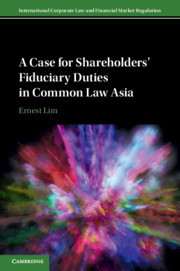Description
A Case for Shareholders' Fiduciary Duties in Common Law Asia
International Corporate Law and Financial Market Regulation Series
Author: Lim Ernest
Reconceptualises the general meeting, controlling shareholders and institutional investors as fiduciaries in four leading common law Asian jurisdictions.
Language: English
Subject for A Case for Shareholders' Fiduciary Duties in Common Law Asia:
Approximative price 43.24 €
In Print (Delivery period: 14 days).
Add to cart
A Case for Shareholders' Fiduciary Duties in Common Law Asia
Publication date: 06-2021
Support: Print on demand
Publication date: 06-2021
Support: Print on demand
Approximative price 156.12 €
In Print (Delivery period: 14 days).
Add to cart
A Case for Shareholders' Fiduciary Duties in Common Law Asia
Publication date: 08-2019
652 p. · 15.6x23.5 cm · Hardback
Publication date: 08-2019
652 p. · 15.6x23.5 cm · Hardback
Description
/li>Contents
/li>Biography
/li>
This book reconceptualises the role of the general meeting and shareholders in the listed companies in four leading common law jurisdictions in Asia (Singapore, Hong Kong, India and Malaysia) as one that should include fiduciary duties. It demonstrates why, when, by whom and how fiduciary duties should be imposed and how they could be enforced. In so doing, it refutes the long-standing common law rule that shareholders can generally vote as they please. The book advances the debate on a central notion of corporate law, namely, the interests of the company. It addresses the deficiencies in the law regulating conflicts of interest involving controlling shareholders and institutional shareholders and provides solutions to the problem of activist and passive minority institutional investors. This book challenges us to rethink the meaning and implementation of the long-term success of the company and shows how corporate governance should and could be made.
Part I. Introduction and Overview: 1. Introduction; 2. Common law jurisdictions in Asia: an overview; Part II. Role of General Meeting and Shareholders: 3. Powers, shareholders and justifications for duties; 4. Objections; Part III. The Mechanics of Imposing Duties: 5. 'What', 'whom', 'when', 'who' and 'how'; Part IV. Enforcement: 6. Enforcement; Part V. Conclusion: 7. Concluding remarks.
Ernest Lim is an Associate Professor at the Faculty of Law, National University of Singapore (NUS). His main research interest is comparative corporate law and governance. He is also interested in private law and its relationship with public law, and legal aspects of artificial intelligence. He has held visiting appointments at Columbia University, Max Planck, University of Oxford and Tel Aviv University. A graduate of the University of Oxford, Harvard Law School and NUS, he practised corporate law in New York and Hong Kong prior to entering academia. He is the author of Sustainability and Corporate Mechanisms in Asia (Cambridge, forthcoming).
© 2024 LAVOISIER S.A.S.




